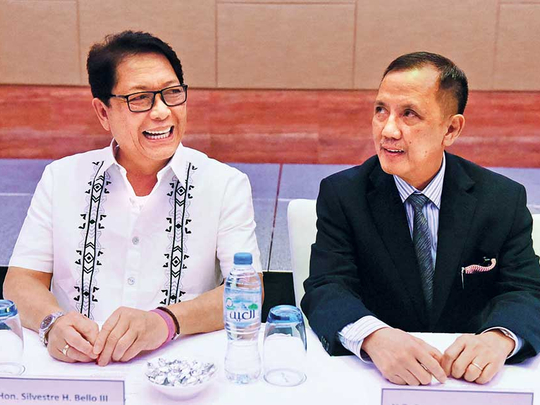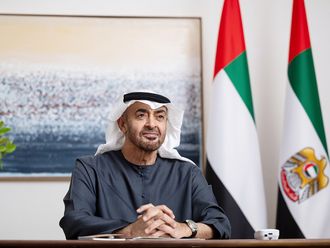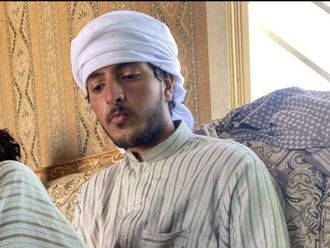
Abu Dhabi: The cooperation agreement regarding the recruitment of Filipino domestic workers in the UAE is a milestone achievement that should open up employment opportunities for many more Filipinos, a top diplomat said in the capital on Wednesday.
“This agreement will clarify avenues for domestic workers to direct any grievances and concerns, and once the recruitment begins, we expect many Filipinos to take up employment here,” Constancio Vingno Jr, Filipino Ambassador to the UAE, told Gulf News.
“With this agreement, overseas Filipino workers will have stronger protection and the firm assurance from both the Philippine and UAE governments that protection will be the first order of the day,” added Silvestre Bello III, the Philippine Secretary of Labour and Employment.
The officials were referring to the Memorandum of Understanding signed on Tuesday between Saqr Ghobash Saeed Ghobash, the UAE Minister of Human Resources and Emiratisation, and Bello III. They were speaking on Wednesday on the sidelines of a meeting with Filipino community members in the capital.
“We have been working on this agreement for a while now, including my honoured predecessor, and I am fortunate this historic resolution has come through during my term,” Vingno Jr said.
The direct recruitment of domestic workers from the Philippines has been at a standstill since June 2014 because of a unified contract introduced by the UAE Ministry of Interior that led to the suspension of various embassies’ role in verifying and attesting contracts. Philippine domestic laws, however, dictate that labour agencies must verify and record all contracts of household service workers before deployment in order to ensure their protection. To resolve these conflicting recruitment rules, UAE and Philippine labour officials had held a series of bilateral talks during the last few years.
In the meantime, a huge shortage arose in the UAE of Filipino domestic workers, who are preferred by many families.
Under the new agreement, an identical job offer and eventual employment contract signed by both the worker and the employer will be recognised and recorded by both the Philippine and UAE governments.
“It is heartening to know that the same kind of protection will be offered to domestic workers as to professionals. What’s more, these workers will be better aware of these protections,” Vingno Jr said.
According to the ambassador, there are about a million overseas Filipino workers or expats in the UAE at present. About 10 to 15 per cent of them are domestic workers, particularly maids and nannies.
“Many of the finer details of the agreement, including the minimum wage for domestic workers, still need to be ironed out. But the process has been started. So we can expect other details to be sorted [out] soon, and the necessary approvals from top UAE authorities could even come through by the end of the year,” he added.
Officials at recruitment centres greeted the agreement, saying it would greatly ease the demand for Filipino household service workers.
According to Jad Barghout, chief operational officer at maid recruitment agency Maids.cc, Filipinos’ fluency in English makes them the top choice for expat families. The company works solely with Filipina maids.
“Among the 750,000 domestic workers in the UAE at present, we estimate that 40 per cent are Filipino. They, therefore, make up the biggest national group among domestic workers,” Barghout said.
“Since our launch in mid-2015, we have only been able to recruit Filipina maids locally and from within the region. At present, we place up to 150 maids each month. But with the easing of recruitment processes, we expect to double or even triple this,” he added.
In 2011, a similar maid shortage occurred in Saudi Arabia when Filipina maids were banned in the kingdom following a disagreement over their monthly wages, which are standardised by Philippine laws at $400 (Dh1,470), among other things. The ban was lifted in October 2012 and Saudi Arabia and the Philippines signed a historic agreement resolving the issue in 2013.
Major areas of cooperation under the new agreement
- Collaborative administration of the contract employment cycle, including the use of information technology and exchange of information
- Strengthened regulations to combat human trafficking
- Regulation of recruitment agencies to enforce fair and transparent practices
The Philippine government will ensure the observance of recruitment laws, procedures and regulations, including the physical and mental fitness of workers, provision of information on laws, policies and cultural practices. This will include the effective verification of job offers and contracts, and assistance in distress by the Philippines Embassy, Consulate and Labour Office.
The UAE government will ensure the enforcement and implementation of the labour contract, and uphold the rights of domestic workers according to the UAE Labour Code.
Protocol on Domestic Workers guarantees these rights
- Treatment of the worker that preserves personal dignity and physical safety
- Due payment and no withholding of wages
- Twelve hours of daily rest
- One full day of weekly rest
- Decent accommodation
- Medical treatment
- Retention by the worker of identity documents like passports
- Non-payment [by the worker] of costs and fees on recruitment and deployment
- Non-payment [by the worker] of costs for repatriation












